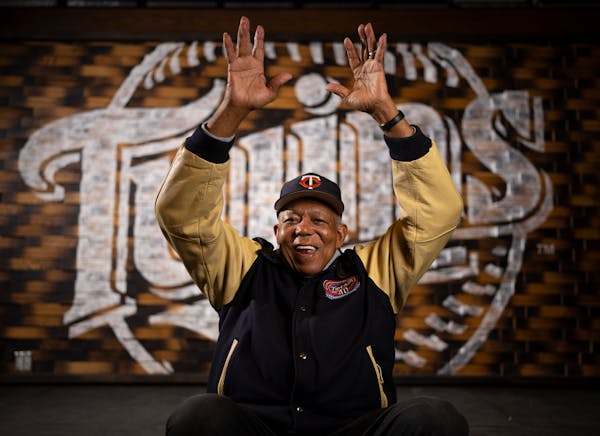 See
more of the story
See
more of the story
Tony Oliva was magnificent to watch as a hitter. The rest was OK, too; good speed and judgment as well as a strong throwing arm in right field. But as a hitter, the images remain for those of us who are vintage Twins followers.
The first notice of his hitting talent came from the Sporting News, during its time as the "Bible of Baseball." Late in the summer of 1961, in its minor league reports in the back of the weekly newspaper, there was a note that Tony Oliva, a young Twins farmhand, had won the Appalachian League batting title with a .410 average.
This was the lowest level of the minors, but .410 grabs your attention and keeps you looking out for that name . . . even though minor league information came at a rate slightly faster than the Pony Express in those days.
Oliva batted .350 for Class A Charlotte in 1962 and .304 for Class AAA Dallas-Ft. Worth in 1963. He was with the Twins in both Septembers, getting a handful of at-bats.
The Twins were ready to install him as the right fielder in 1964. We read the communiques from spring training lauding Tony's line drives, but we didn't see those for ourselves until the start of the regular season.
Televised games were precious commodities in 1964. I'm guessing we were allowed to see the opener in Cleveland on April 14, when the rookie left-handed hitter had a couple of hits, and then came the moment that Tony O.'s potential for greatness was fully revealed on Twin Cities television:
The first game of a doubleheader in Detroit on Sunday, April 19, was the fifth game of Oliva's rookie season. The Twins had played one game in Cleveland, then three at Washington, and Oliva's average was .474 at the start of Game 1 in Detroit.
Phil Regan was the Tigers' starter. Tony was batting second. He ripped a single, sending Rich Rollins to third, from where Rollins scored the game's first run.
Rollins had singled in Bernie Allen to make it 2-0 in the second. Oliva stepped back in. Regan threw a fastball directly at Oliva's head. Tony went sprawling backwards in the batter's box.
Cross my heart and hope to cover another four-hour ballgame, I still can see this: Tony rising slowly, brushing off the dust, and getting back into the same place in the box as he was when Regan attempted to maim him.
Tiger Stadium was short in right field, medium in left field, and a distant 440 feet to straightaway center. When Tony saw his next pitch to hit, he unloaded a rocket that carried over center fielder Don Demeter's head and went to the distant wall. He raced to third for an RBI triple, and Regan wound up going three innings and taking a 12-3 defeat.
And we knew right then this lefty hitter from Cuba would not be intimidated from hitting his liners.
Notoriously, Oliva became the first rookie to win an American League batting title that season at .323. What's not remembered as quickly is that he also led the AL in doubles (43), runs scored (109), hits (217) and total bases (374). Nine triples and 32 home runs gave him 84 extra-base hits.
Looking back, you can see the creep of pitching dominance that eventually led to the Year of the Pitcher in 1968, which in turn led to the lowering of a pitcher's mound from 15 to 10 inches, and the introduction of the designated hitter to the American League in 1973.
So, these numbers you see from the young Tony O., another batting title in 1965 at .321, another league lead in hits at 189, and 40 more doubles ... that's a splendid number of line drives in that era of stud pitchers still throwing off tall mounds.
Rod Carew was far and away the best average hitter the Twins ever employed, and Harmon Killebrew was far and away the best power hitter the Twins ever employed. But as a Twins' follower from the generation that still can see him going from near death to a screaming triple off Phil Regan, I put Tony O. in his eight healthy seasons alongside Kirby Puckett in his 12 seasons as the Twins' best all-around hitters.
Carew had been added to the 16-person Golden Age Committee that was voting Sunday on Hall of Fame candidates. Rodney, with his heart transplant and now 76, had to cancel the trip to Orlando, Fla., due to COVID concerns. He was replaced on the committee by Bert Blyleven, the former Twins pitcher and also a Hall of Famer who had to wait quite a while for his election.
A maximum of five players could be checked on a ballot, and 12 votes were needed to be invited into Cooperstown. Four players made it: Oliva, his long-time Twins teammate Jim Kaat, his fellow Cuban Minnie Minoso, and Gil Hodges.
Carew was given the result at his home in California. His happiness for Kaat was large, and the bond with Oliva had him emotional when the votes were counted in Tony's favor this time.
Carew and Oliva were road roommates for 11 years. From 1964 through 1977, they combined for 10 of the AL's 14 batting titles – seven for Rodney, three for Tony.
Pitchers still were dominating when Tony won his third batting title in 1971. He was batting .375 on June 25 in Oakland, when he dived for Joe Rudi's sinking liner and smashed his already balky right knee into a sprinkler head. He missed a series of games, then returned and limped to the title at .337.
I was talking about that with Tony a while back and he said: "I was 31, in my prime. I was hitting the ball so nice in 1971. I was killll-ing it.''
Carew arrived as a Rookie of Year in 1967, three years after Oliva won his rookie award. Rodney saw Tony with a real foundation as a hitter for most of five seasons. And then came the sprinkler head and the knee that wound up being patched eight times by surgery.
"As his roomie, I knew as much about what Tony went through with his knees as anyone,'' Carew said. "The first thing I did when we got to our room at night was to go to the ice machine for Tony. I would hear him moaning, groaning, sometimes even crying, he was in so much pain.
"Then, he would play the next day, and hit a couple of line drives. He drove in 90-some runs on one leg as a DH in 1973.''
Carew, a first ballot Hall of Famer in 1991, paused and said: "This is one of the happiest days of my life.''







